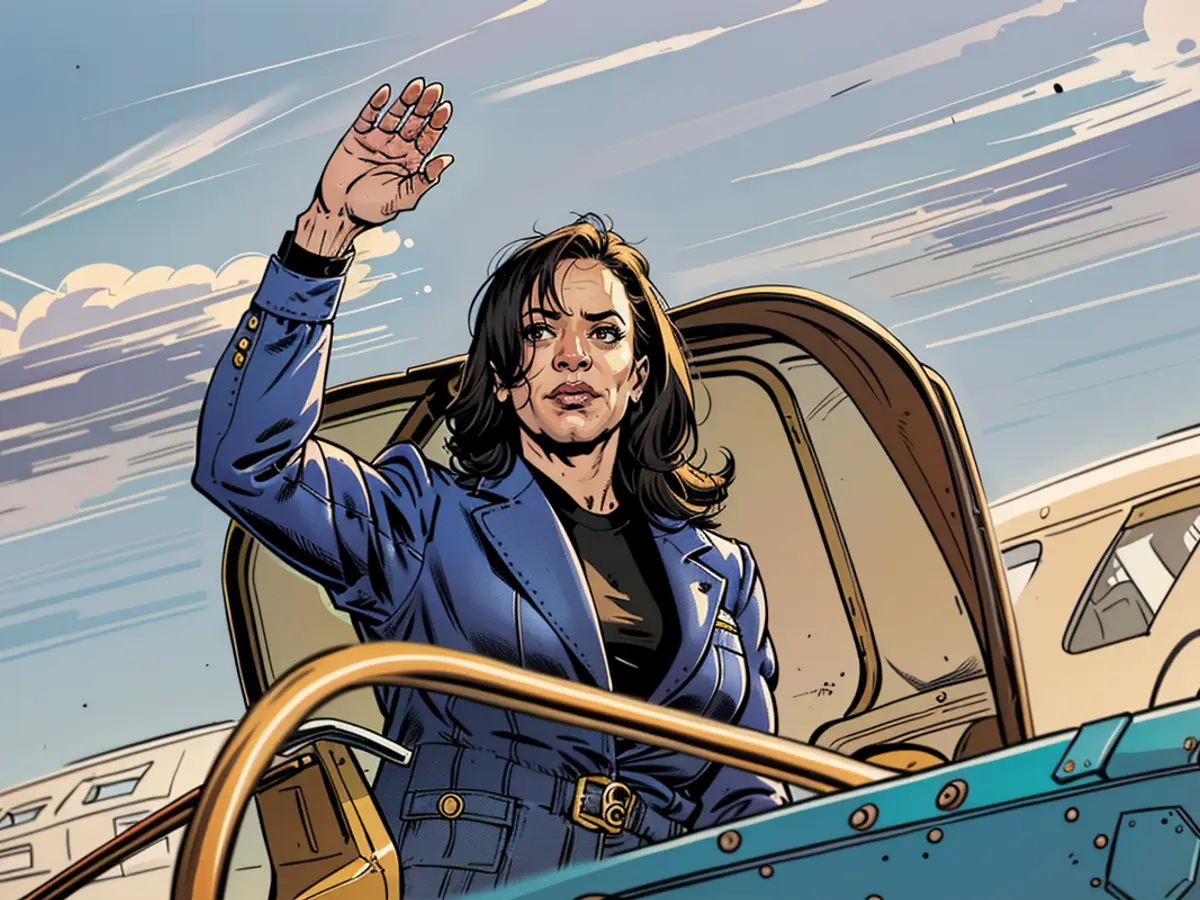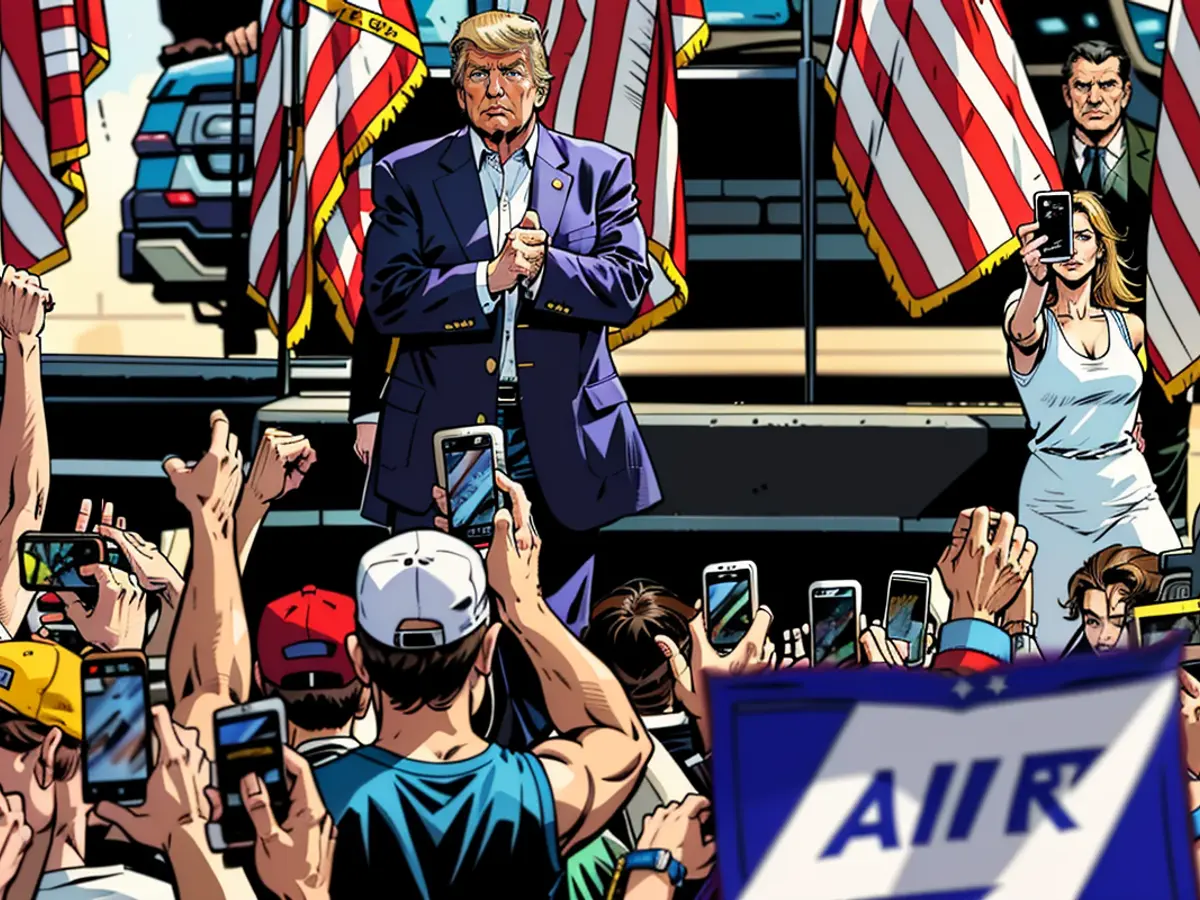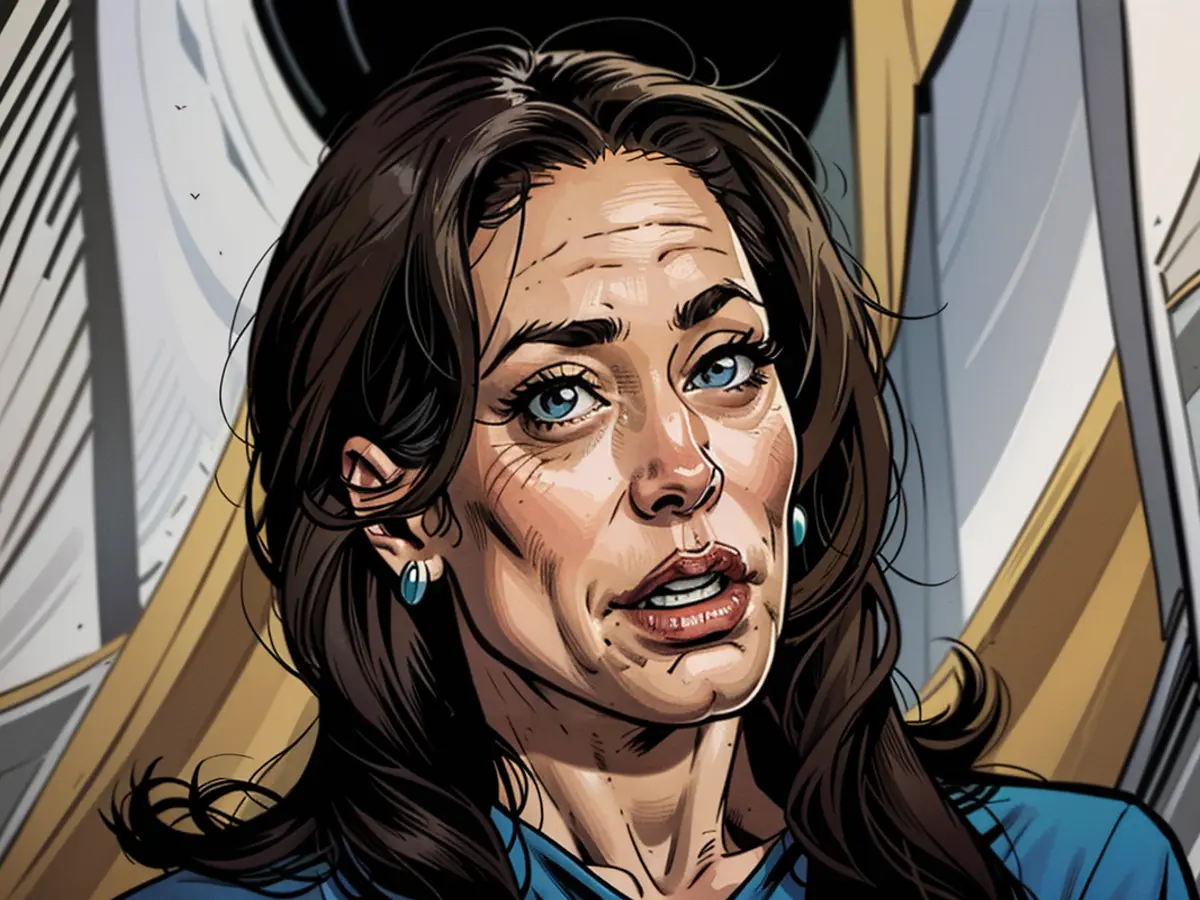Il comportamento di Trump continua a peggiorare, ma la corsa alla presidenza alla Casa Bianca rimane imprevedibile.
Il caos verbale del ex presidente nelle ultime settimane ha risvegliato ricordi dei suoi quattro anni turbolenti alla Casa Bianca e ha messo in discussione l'idea che stia conducendo una campagna più controllata rispetto al 2020 e al 2016. Tuttavia, lo stato quo della corsa - una lotta testa a testa negli stati oscillanti - rimane invariato.
Trump ha lanciato false accuse sui migranti nell'Ohio che mangiano animali domestici. Ha avvertito che gli elettori ebrei sarebbero stati ritenuti responsabili se avesse perso a novembre. Ha rifiutato di condannare pubblicamente il suo protetto alle elezioni governatoriali della Carolina del Nord, che si è definito un "Nazi nero" su un sito per adulti, come ha recentemente rivelato CNN's KFile. Trump ha anche suggerito che la vicepresidente Kamala Harris e i democratici stessero istigando minacce contro le loro stesse vite enfatizzando il suo diniego delle elezioni del 2020 e dipingendolo come una minaccia per la democrazia.
Incredibilmente, l'ex presidente si trova in una corsa descritta da CNN senior political data reporter Harry Enten come la "più stretta elezione presidenziale" dal momento in cui il democratico John F. Kennedy ha superato il vicepresidente Richard Nixon.
La governatrice del Michigan Gretchen Whitmer, figura chiave nelle speranze di Harris per la vittoria nello stato democratico cruciale del Michigan, ha riconosciuto la strettezza della corsa su CNN's "State of the Union". Whitmer ha detto: "Sarà una corsa serrata. Lo sapevamo fin dall'inizio". Aggiungendo: "In uno stato come il Michigan o la Pennsylvania, il Wisconsin, sappiamo che sarà una corsa serrata".
La natura stretta della competizione è stata sottolineata dai commenti e dalle tattiche dei candidati durante gli scambi della campagna del weekend.
Harris ha suggerito che Trump stesse cercando scuse per evitare il dibattito dopo aver accettato l'invito di CNN per il 23 ottobre. D'altra parte, Trump ha tentato di cancellare il divario di genere che minaccia la sua elezione bombardando Truth Social con un post tutto maiuscolo in cui prometteva di proteggere le donne come mai prima d'ora.
In una rara nota introspettiva, Trump ha detto a Sharyl Attkisson durante un'intervista su "Full Measure" che non ha intenzione di candidarsi di nuovo nel 2028 se perderà a novembre. "Penso che... quella sarà la fine. Non lo vedo affatto".
Nessun chiaro favorito
Despite the mounting campaign trail tension, the race remains stagnant, where it has been for weeks - stalemated.
Since her debate with Trump, national polls have marginally improved for Harris. However, there's no clear victor, with Harris at 50% and Trump at 47% in the latest CNN Poll of Polls average. Five surveys conducted after the September 10 debate contribute to this average. A poll released on Sunday by NBC News shows Harris with a margin of 49% to Trump's 44%, setting his lowest poll support level in a survey meeting CNN's criteria since Harris assumed the Democratic nominee role from President Joe Biden in July.
While Harris' upward trajectory offers hope for her supporters, the presidency largely depends on Electoral College results. Consequently, polling averages in crucial swing states, such as Pennsylvania, Georgia, Nevada, Wisconsin, Michigan, and North Carolina, show the contest teetering on the brink. A handful of voters in these states could tip the scales towards Trump or Harris, with significant implications for the nation and the world.
So, why does the race remain so unpredictably tight?
Considering his controversial exit from the presidency, marked by inciting a riot by his supporters at the US Capitol on January 6, 2021, and his refusal to acknowledge defeat, Trump's comeback attempt is nothing short of astonishing. His repeated impeachments and pending serious criminal charges stand in stark contrast to any politician's survival odds.
Originally, the Biden campaign's strategy hinged on the belief that once voters witnessed the unfiltered bombast of Trump, they would recall his turbulent term and vote against him. However, Biden's poor performance at the CNN debate in June, which exposed his age, destroyed the contrast. Harris, who changed the game when she replaced Biden, has attempted to highlight her pragmatism versus Trump's extremism, portraying him as an "unserious man" and a "serious threat." Despite her efforts, the best Harris can spin with only six weeks remaining is that her entry into the race has transformed a race Democrats looked certain to lose into a competitive, nail-biting contest.
Trump's exceptional resilience as a politician - can he seize victory?
Any analysis of the future must first acknowledge the extraordinary resilience of Trump as a political figure. He has indelibly transformed the Republican Party, securing a solid grip on the GOP base as the party's nominee for a third consecutive election.
Despite the animosity of his first term, polls reveal that many voters perceived their financial security to be stronger under Trump until the Covid-19 pandemic struck.
Despite potential sympathies, Trump might not clinch victory due to his consistency in failing to garner majority support from Americans. His 47% approval rating in the CNN Poll of Polls highlights this recurring issue throughout his presidential political journey.
The question arises if an alternative Republican candidate could outperform Trump in a direct competition with Harris. This hypothetical figure should not repel key swing-state moderates, suburban voters, and disillusioned Republicans while contesting in primaries. Regrettably, such a candidate was not backed during the recent primary races, and notable contenders like Florida Gov. Ron DeSantis and former South Carolina Gov. Nikki Haley failed to gain mainstream support.
Harris, in contrast, serves as a last-minute substitute for a contender Broadway audiences deemed unfit for a second term. A herculean challenge awaits the vice president – shielding their party from probable November defeat while acting as a potential salvation for democracy itself. While marketing herself as a fresh, transformative leader, Harris remains tethered to an unpopular administration facing a harsh political environment.
L'inchiesta NBC offre alcune informazioni su questa dinamica peculiare. La maggiore preoccupazione tra gli elettori riguarda l'inflazione (28%) e il costo della vita - un aumento rispetto ad aprile, quando il problema era al 23%. Le minacce alla democrazia e l'erosione delle libertà democratiche è il secondo problema principale, al 19%. Nonostante preferiscano il Partito Democratico, questo argomento potrebbe anche rappresentare un crescente sostegno alle affermazioni di Trump su un sistema giudiziario manipolato che rappresenta minacce per le democrazie. Il terzo problema più urgente riguarda l'immigrazione e la protezione dei confini (-14%), un'area in cui i sondaggi mostrano costantemente vulnerabilità per Harris. L'aborto, uno dei suoi principali problemi, ha ottenuto il sostegno solo del 6% degli elettori.
Il potenziale cambiamento delle elezioni
Le preoccupazioni degli elettori sull'economia indicano il potenziale per qualsiasi candidato di acquisire un vantaggio prima delle elezioni. Trump ha mostrato diverse proposte economiche, tra cui l'eliminazione delle tasse sui consigli e la modifica della politica fiscale statale e locale del suo governo.
Harris, d'altra parte, cerca di rendere la vita più accessibile affrontando i problemi dell'edilizia, dell'assistenza all'infanzia e della salute. Cerca di convincere gli elettori della sua comprensione empatica dei prezzi crescenti delle verdure, che sono rimasti elevati nonostante la Federal Reserve abbia recentemente abbassato i tassi di interesse.
Questa settimana, Harris cercherà di contrastare le accuse di mancanza di chiarezza nei suoi piani mentre gli elettori indecisi degli stati oscillanti valutano se fidarsi di lei per migliorare le loro condizioni di vita. "Farò un discorso questa settimana", ha detto, "per chiarire la mia visione dell'economia, che ho battezzato un'economia delle opportunità. Questo piano prevede sostanzialmente di investire nei desideri, nelle ambizioni e nei sogni del popolo americano mentre si affrontano gli ostacoli che incontrano - siano essi prezzi elevati delle verdure o sfide nella proprietà della casa".
L'approccio di Harris sottolinea un'elezione definita dalle frustrazioni degli elettori, che favorisce il candidato repubblicano, mentre mantiene una corsa serrata a causa della capacità di Trump di alienare potenziali elettori, indipendentemente dal suo seguito fedele.
Il senatore Lindsey Graham della Carolina del Sud, un sostenitore devoto di Trump, ha riassunto lo stato attuale della corsa durante una conversazione con NBC's Kristen Welker a "Meet the Press". Ha dichiarato: "Il 65% delle persone nel tuo sondaggio ritiene che il paese sia sulla strada sbagliata. Chi può meglio affrontare il problema della criminalità? Trump ha un vantaggio del 6%. Chi è il migliore per l'economia? Trump di 9 punti. Inflazione? Trump di 8 punti. Protezione dei confini? Trump gode di un vantaggio del 21%".
"Cosa mi dice questo sondaggio? Sulle questioni fondamentali che riguardano gli elettori americani, Trump trionfa in modo schiacciante. Tuttavia, in uno scontro diretto, vacilla".
despite the controversy surrounding his campaign, former president Trump's approval ratings remain high in certain areas, such as his handling of the economy before the Covid-19 pandemic, as indicated by polls. However, his consistency in failing to garner majority support from Americans, with a 47% approval rating in the CNN Poll of Polls, could potentially hinder his chances of securing victory.
The race between Trump and Vice President Harris remains tight, with no definitive frontrunner in sight. A survey conducted by NBC News shows Harris with a margin of 49% to Trump's 44%, marking his lowest poll support level since Harris assumed the Democratic nominee role from President Joe Biden. Polling averages in crucial swing states like Pennsylvania, Georgia, Nevada, Wisconsin, Michigan, and North Carolina indicate that the contest is teetering on the brink, with a handful of voters in these states able to tip the scales towards either candidate.









